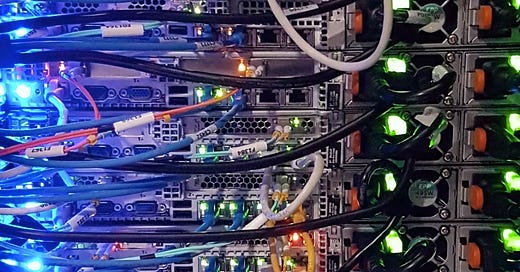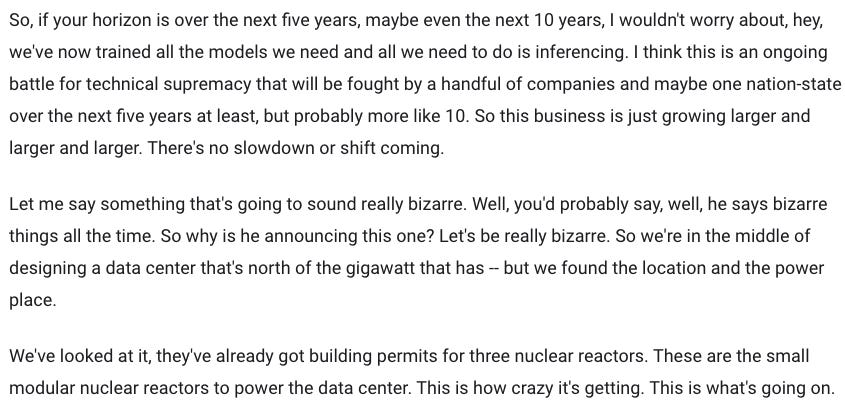Tech is fun again, and I’m here for it
Shoot for the stars. The worst case is you smack into the moon and learn something you didn’t expect to.
Welcome to Cautious Optimism, a newsletter on tech, business, and power. Especially upbeat today. Subscribe, share or forward with friends and colleagues.
📈 Trending Up: Hurricane damage … lmao … gallium nitride … humanoid robots … Novatus … airline profitability … Moneyview … irony … debate ratings … moving to Ghost …
📉 Trending Down: Capital for Black women … European competitiveness … Chinese private-market investment (FT) … humans on Earth … stability in West Africa … Argentinian inflation …
🖥️ Gaming layoffs: I am a capitalist, but I don’t think that I could sleep if I had hundreds of billions of dollars, bought a company, and then fired thousands of its workers.
Capitalism good; treating humans like disposable tissue is bad.
Medium recap: I got the goods on the Medium recap from its CEO, including how many investors participated and the like. That’s coming tomorrow; today, we’re going to put a smile on our faces and look towards the horizon a bit.
Tech is fun again, and I’m here for it
Think back to when you first played with ChatGPT. Do you recall the joy? I remember showing it to my mother who was visiting at the time, using the service to come up with all sorts of silly poems and jokes for her. She loved it, immediately taken with the new tool. I felt like a wizard, showing her how it worked.
The day before, we didn’t have an incredible service that could ape human intelligence on command. Then we did.
ChatGPT is still going strong — it recently crossed the 200 million weekly active user mark, and is seeing search demand rebound now that school is back in session.
OpenAI’s most famous creation and a number of other AI tools are still resonating in the consumer space. What isn’t is optimism that genAI tools in the business context are going to be worth much for a long while.
Here’s a sample lede from the Wall Street Journal published yesterday:
The press is simply doing its job here, bringing skepticism to a heated market; looking at the numbers, and asking if they add up.
But it’s not merely the media that has questions. Sequoia raised the same query on its own pages, asking when revenue that would make massive infrastructure spend in support of AI would start to show up.
It has in a few ways — something that we explored the other week here on CO — but not as quickly as some sunny folks expected. Yes, hyperscalers like Azure and AWS are lapping up demand, but what has come out the other end of all that compute in terms of corporate customer performance? The winnings there appear modest still compared to spend.
The Journal made the point well:
My question: Are we being too pessimistic?
I suspect that after several failed tech cycles that wound up being fads instead of the foundations for new cohorts of winning companies, many in tech — and outside of it — are too rigidly skeptical of new potential. The crypto boom and its promise of this will change everything, for example, was a lesson. But perhaps not one that teaches us much about the current AI wave, I think.
There good reason to be wary of AI tech as it exists today. Rampant IP theft, quick depreciation of yesterday’s models, massive compute costs, and where we’re going to get all the power and water we need to feed our ever-larger compute centers are real issues.
Real issues that are not big enough to take the smile off my face. Why? Because even if AI doesn’t deliver hoped-for productivity gains today, or tomorrow, tech as an industry is being ambitious in a way that got lost in the SaaS era.
Software as a service was metricized to death, turning most founder energy and startup grit into apps that plugged small gaps in corporate workflows. Sometimes the investments paid off handsomely, but who really wakes up in the morning bursting with joy about grinding a SaaS service that doesn’t do that much into something incrementally larger?
AI’s hype cycle, in contrast, is driving a wave of exciting investment that has me stoked. Optimistic, even.
Oracle, for example, has long been a technology punchline. The famous comic is good indication of what most folks thought about the venerable tech giant. Hell, everyone I know who has worked at Oracle has told me stories of crying at work.
And yet, the AI moment seems to have given Oracle new lease on life. Here’s CEO Larry Ellison from the recent Oracle earnings call:
Modular nuclear reactors to power newly massive datacenters that are going to train big fucking AI models? I love it. This is pushing forward. This is shaking up the state of the art instead of, I don’t know, optimizing another fucking login button on Facebook, or tweaking a user onboarding flow for yet another piece of HR software. Or a CRM plugin. Or a platform to aggregate CRM plugins. Or an API to ingest or disgorge data from aggregated CRM plugins. You get the idea.
The Oracle riff reminds me of something that Atreides’ Gavin Baker said recently:
In our lifetimes, the hundred largest buildings in the world will be data centers.
Oracle seems to agree.
Let’s build tons of power and massive new compute clusters and see what we can rip out of it! The infra spend might not pay off in trad ROI terms — or timelines — but the companies doing the work here can afford the potential boondoggle. With cash to spare. And all we’d get in the case of a complete AI miss would be a huge expansion in the artificial compute power of the human race.
Shoot for the stars. The worst case is you smack into the moon and learn something you didn’t expect to.
Today, there’s a startup building a supersonic jet. Private companies are launching more rockets than ever before; we just saw the first private-market space walk. This is exciting shit!
And what’s perhaps best of all is that you cannot, like SaaS, turn the above into a ratio or metric that gists an entire company down to a single datapoint that can be modeled against. You can’t MBA your way to Mars, in other words.
Venture capital got real dull for a while, becoming a very expensive way to fund increasingly middling enterprise software companies. Perhaps now with venture capital funds putting cash into more science-fiction-esque companies and technology majors racing to build ever greater silicon brains, we’re back on track for tech to get exciting again.
You could phrase it like this:
The mobile revolution has so run its course that even Apple is having a hard time getting consumers excited about its new phones;
While, at the same time, just four tech companies spent nearly $53 billion on capex alone last quarter as they race to own the AI future.
Hell, even self-driving is making real progress despite hiccups in how long it is taking to get to market. A bit like AI might prove out.
So does the above justify OpenAI at a $150 billion? Sure, fuck it. Why not? Let’s swing so hard at a future in which our computers can do more than follow direct commands that it either comes true, or we burn the fuck out of the idea trying to get it to work. Let’s get some risk in the market, and some more adventurous capital in flight, yeah?






